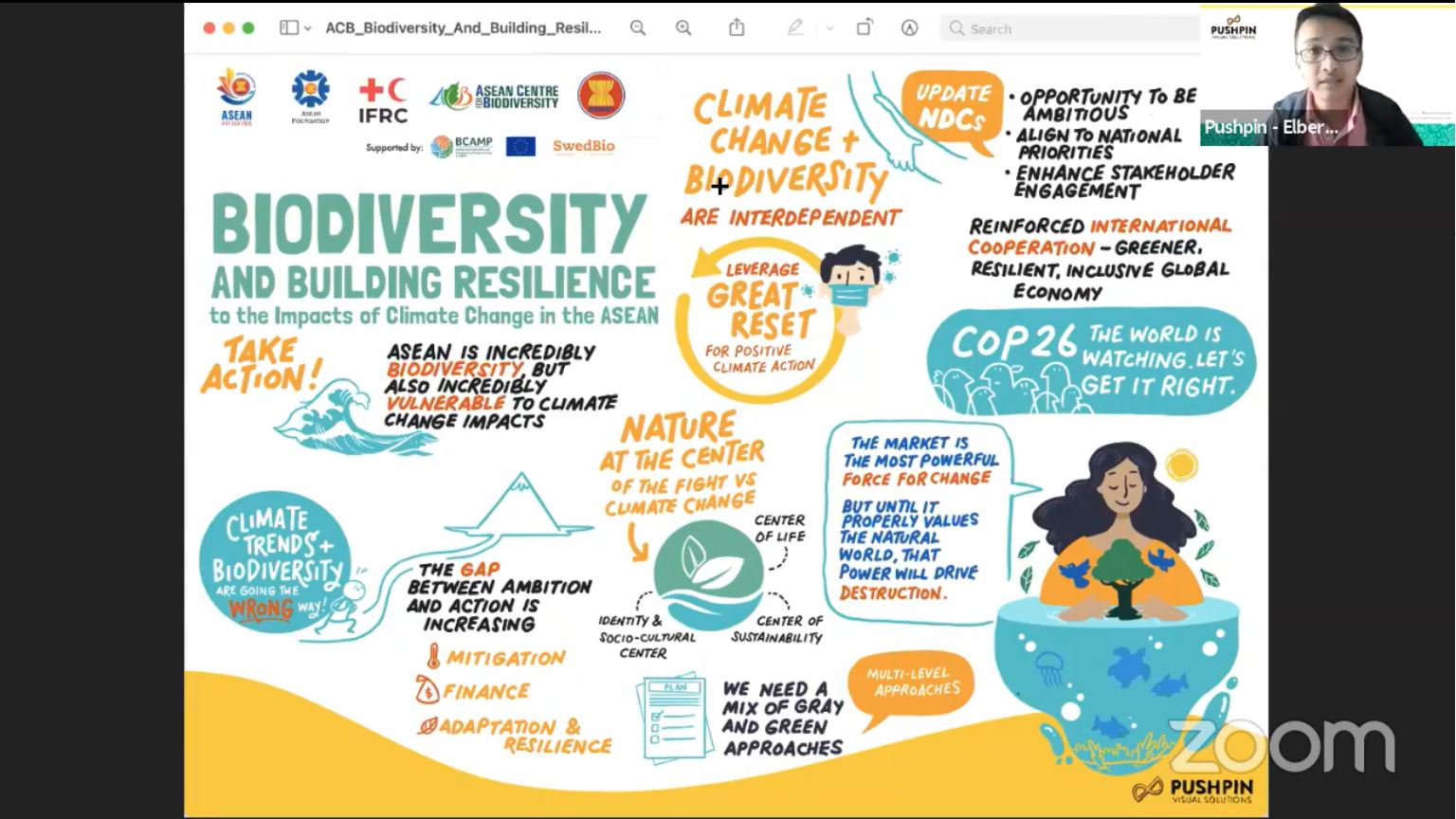
December 14, 2020 Monday

MANILA, 15 December 2020 — Environmental experts, advocates for climate change resilience, and members of the academe and civil society gathered virtually today to discuss the importance of nature-based solutions in building better climate change resilience for countries in the ASEAN region and beyond at the “Biodiversity and Building Resilience to Impacts of Climate Change in ASEAN” webinar.
The virtual event, moderated by Mr. Jerome Ilagan, Chief of the Policy Research and Development, Climate Change Commission of the Philippines (CCC), featured biodiversity experts Mr. Tristan Tyrrell, Programme Officer of SwedBio; Dr. Isabelle de Lovinfosse, Head of Southeast Asia COP26 Strategy, British High Commission; and Mr. Krissusandi Gunui’, Executive Director of Institut Dayakologi.
In his opening statement, Mr. Ilagan said, “The manifestations of climate change impacts are now being felt in all countries in the ASEAN region. In a region where biodiversity is recognized as one of the richest in the world, it is imperative that ASEAN take immediate and concerted action to address the impacts of climate change.”
This would set the tone for the webinar as other speakers discussed the importance of taking immediate action towards building resilience in the region and the rest of the world.
“There is no denying that climate change and its severe impacts on the environment and our lives and well-being are already here. We can no longer keep this to our back burner as this issue cuts across the present challenges that hound us today. The far-reaching consequences of climate change disrupt our daily lives and stunt our development. ASEAN countries, especially in the past few months, have experienced stronger and more disruptive typhoons that came one after the other, leaving people dead and destroying millions worth of properties. Indeed, this climate crisis is one of the main culprits that drive the loss of nature. But the main paradox here is that biodiversity and its ecosystem services also underpin our principal solutions and efforts to tackle climate change and its impacts. Without healthy biodiversity, our fight against climate change should be an impossible feat,” Executive Director Dr. Theresa Mundita Lim of the ASEAN Center for Biodiversity (ACB) said in her opening remarks.
Assistant Secretary Ricardo Calderon of the Department of Environment and Natural Resources (DENR) observed that, “We experienced five typhoons that hit the country and we could see that despite the well-managed protected areas with the average forest cover of 75%, there’s still flooding, there’s still swelling of the rivers. It simply means that our natural ecosystems cannot anymore absorb this kind of extreme rainfall-type events. And the impact, as far as the community is concerned, to the natural resources including the wildlife is very severe and very difficult to recover.”
His statement is just one of the few that followed as government officials and environmental experts made sense of the devastation linked to climate change.
Dr. Isabelle de Lovinfosse discussed the United Kingdom’s planned key campaigns for COP26. She discussed the country’s plans on closing the ambition gap to address the Paris Agreement’s three pillars, namely: (1) to increase the level of ambition by governments and non-government actors; (2) to mobilize international climate finance from donor countries and the private sector to support other countries; and (3) to increase efforts that are devoted to domestic and international acceleration in support of ASEAN economies and communities.
“Climate and biodiversity are forever closely interdependent. Climate change is already impacting biodiversity losses and ecosystem damage. And the same human activities are the drivers of both issues, like unsustainable land use, deforestation, intensive agriculture, and natural resource destruction. Nature-based solutions are not the only solutions to climate change problems, but they have a large role to play,” said Dr. Lovinfosse.
Countries in the ASEAN region continue to bear the impacts of climate change and land degradation wreaks havoc on biodiversity, thus resilience is needed more than ever. The COVID-19 crisis has brought to light shortcomings in several areas, from insufficient disaster risk reduction in several countries to the inequities in the global economy. However, as shared by Dr. Nagulendran Kangyatkarasu, the Deputy Secretary-General of Malaysia’s Ministry of Environment and Water, they are choosing to use this time as an opportunity to come up with more robust solutions to address the impacts of climate change in relation to biodiversity.
Following the presentations, invited reactors shared their thoughts and opinions on the topic. The overarching theme was a call for cooperation in the international community. They discussed the need for the active participation of the public and private sectors in resilience building.
Biodiversity and the natural environment possess functions that mitigate the manifestations of climate change impacts. In adopting and implementing nature-based solutions and ecosystem-based adaptation, countries in the ASEAN region and around the world are one step closer to improving risk mitigation and conservation efforts.
This webinar was organized by the ASEAN Centre for Biodiversity, in collaboration with the Climate Change Commission, with support from SwedBio at the Stockholm Resilience Centre.